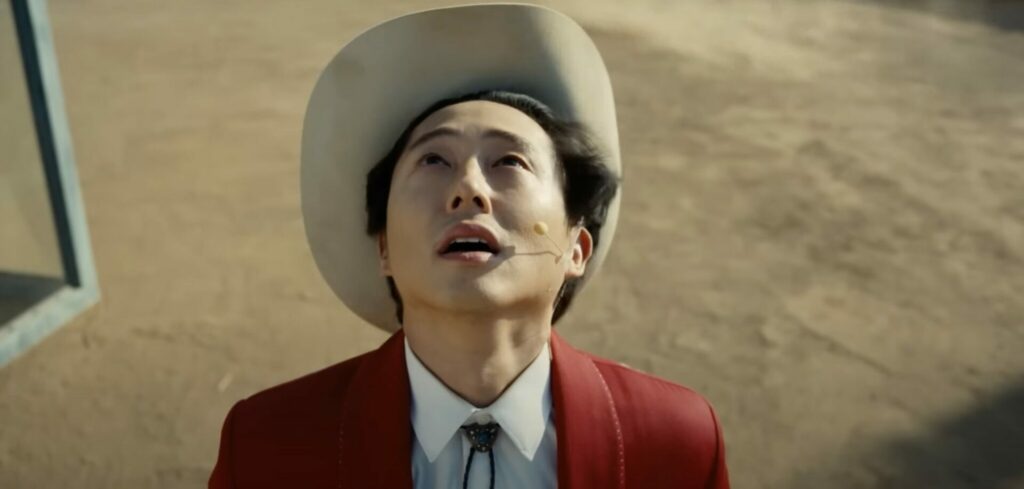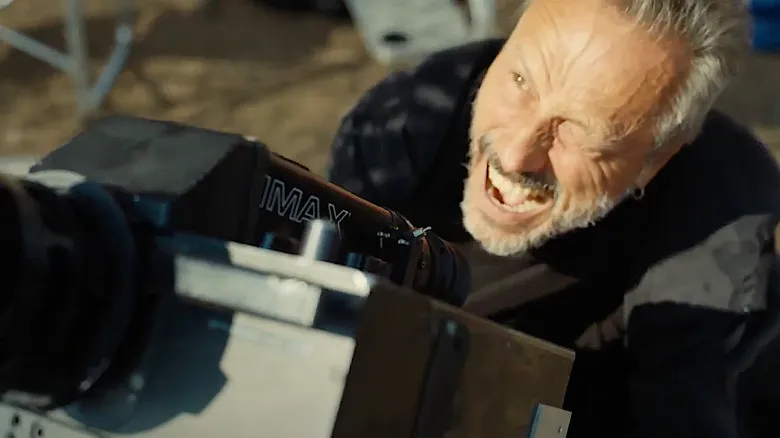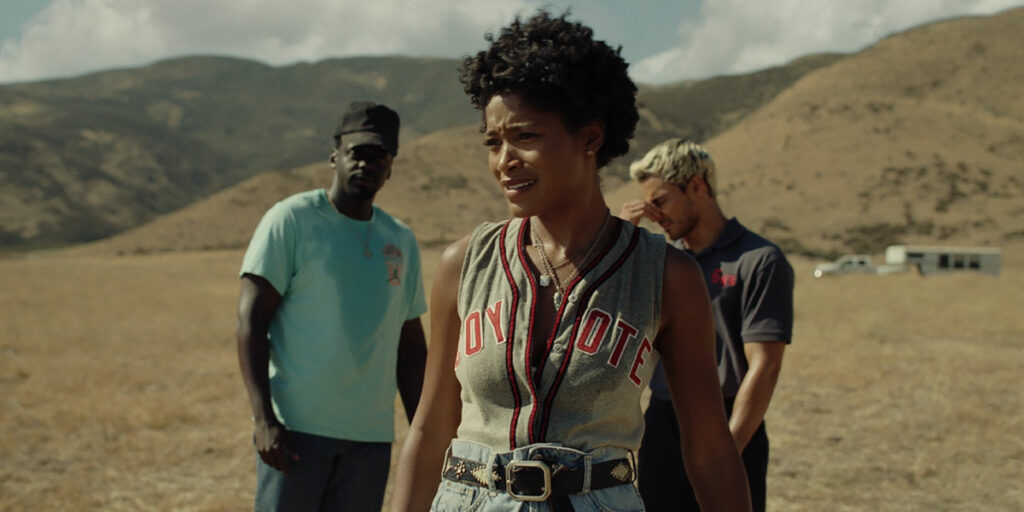Peele wears his clever, theme-conscious heart on his sleeve with Nope, a Spielbergian-western that stealthily unveils our addiction to spectacle.
This article contains spoilers for Jordan Peele’s Nope (2022).
Often touted by critics as ‘overstuffed’, or by my middle-aged parents as just plain sh*t, Nope has become digestible in one of two ways; a teetering on the edge-of-your-seat spectacle or a cryptic mess to argue about with your mates and the likes of YouTube Explained. Though some audiences may have struggled with the density of themes that Peele explores, I found Nope to be a compelling analysis of our relationship with entertainment and addiction to spectacle. With this in mind, I wanted to unpack the film through this lens with the hopes that someone who walked out of the theatrea little perplexed might have a chance to re-examine the film from a different perspective.
Nope centres on two siblings running a horse ranch in California who discover something glorious and sinister in the skies above. Facing financial battles, Emerald (Keke Palmer), the get-rich-quick type, insists she and OJ (Daniel Kaluuya) pursue ‘the Oprah shot’: undeniable proof of aliens on camera. Meanwhile, theme park owner Ricky (Steven Yeun) tries to profit from this mysterious, otherworldly phenomenon.
Peele said he wrote the script at a time when we were a little bit ‘worried about the future of cinema’ and coming off two years in a reclusive lockdown, he knew the first thing he wanted to create was a spectacle, ‘something the audience would have to come see.’
Not given to irony, Nope opens with a bible quote from The Book of Nahum 3:6: ‘I cast abominable filth at you, make you vile, and make you a spectacle.’ Nahum shows us that the path of adoration and exploitation only leads toward tragedy and destruction. If you’ve seen the film just once, this quote may feel ineffective. Hell, you’ve probably forgotten it was there to begin with, as we cut to a dishevelled television set and Gordy, a bloodied chimpanzee with a party cone strung around his head.
This prologue becomes clear later on when we learn Ricky was a child actor who starred in the short-lived 90s sitcom Gordy’s Home, his co-star being a 200-pound chimp. When filming a birthday-themed episode, the sound of a balloon popping scared Gordy into a violent rampage, killing and maiming members of the cast before being shot dead, sparing Ricky’s life as he hid scared-stiff under a table.

This disturbing scene stayed with Ricky, though it left him feeling as if surviving was some miraculous feat motivated by a higher power. Ricky proceeds on to commercialize his trauma, creating a theme park called Jupiter’s Claim, where he houses a secret shrine with memorabilia of Gordy and the horrific accident, including the party hat and co-star Mary-Jo Elliot’s blood-splattered shoe.
Ricky boasts about people who pay thousands to spend the night in this small museum, appearing unfazed as he recalls the incident. But here’s the kicker: rather than discussing it through his own point of view, he refers to the Saturday Night Live sketch that recreated it. “He is crushing it, he is a force of nature”, He says, describing comedian Chris Kattan’s portrayal of the startled chimp before we cut to a young Ricky shaking under that table, watching as Gordy mauls his co-stars. This horrific incident, now merely an exhibition to marvel at with cash, shows us even survivors like Ricky, who you’d expect to want to forget their trauma, have instead become infatuated by the awe of his experience, commoditizing it.
Spectacle captivates. It satisfies our need for excitement, but as Peele demonstrates, it can just as easily swallow us whole. He often describes the world we live in as a ‘society of spectacle’. He told NBC News, ‘we use the spectacle to distract us from truth’, for example, the commercial churn of social media. Nowadays, virality and fame balance on the same wire. It’s alarming to consider the likelihood of scrolling on from a giggle-worthy celebrity meme to a video of a natural disaster or body-cam footage of a police beating. Peele examines our addiction to spectacle and invites the audience to question their attraction to tragedy.
For example, the act of slowing down to rubberneck a five-car pile-up on the highway. We often find ourselves captivated by the awe of someone else’s awful experience. This concept is tied to the psychology of morbid curiosity: the innate interest in unpleasant things like death, pain and degradation. In this instance, the accident provides the onlooker with an opportunity to confront their fears without being directly involved: knowing you can drive away safely. Similar to the way we experience media, we watch a boxing film to experience what it would be like to have that brute strength and skill. Yet, we are able to leave the theatre without a scratch.
Ricky feeds horses to the alien in order to provide entertainment to his paying audience, an audience sitting comfortably on arena seating and a nearby slushy cart to quench their eagerness. Peele plays with this idea later on, when OJ realises that the act of looking directly at the alien is what provokes it. The choice to look away inevitably saves the characters’ lives. However, Antlers Holst (Michael Wincott), the famed cinematographer Emerald had recruited to help record footage of the UFO, looks up, willing to sacrifice himself for the impossible shot. Peele’s message is clear: drive away from the accident, don’t yield to it.

Ever since shouting my love of Nope from the rooftops, or in this case, the internet, I’ve often been asked what the ‘point’ of the Gordy’s Home scene was. It felt like filler for some audiences, who were unable to comprehend its existence beyond exposition for Ricky. In fact, it’s one of the most thematically integral moments in the film.
The Gordy’s Home incident becoming this outlandish pop culture phenomenon is reminiscent of what we see in the media today. Just last year, Netflix released a limited series chronicling serial killer Jeffrey Dahmer’s life, from his unhappy childhood to his eventual arrest. The show set social media alight, sparking debate over whether it was an informative piece of media or an exploitative program glorifying a killer and putting the tragedy of real people on display. Packaged, marketed, sold, and watched by nearly 56 million households because we simply can’t look away. We are helping to feed the beast as it’s just far enough away to do so.
While still unconfirmed by Peele, the Gordy’s Home massacre feels loosely based on the real story of Travis the chimpanzee. Travis was raised with humans, including sleeping in his owner Sandra’s bed and sitting head of the dinner table. He quickly garnered national attention by appearing in television commercials, becoming somewhat of a local celebrity. In 2009, Travis escaped their home with Sandra’s car keys, and after attempting to lure him back inside with a toy, asked for friend Charla Nash’s help. Travis attacked Charla, tearing into her limbs, and gnawing off her nose, fingers, and eyelids. Sandra’s phone call to 911 is bone-chilling, as shortly thereafter Travis was shot dead by police.
Unbelievably, Charla survived and underwent multiple facial reconstruction surgeries. She appeared on The Oprah Winfrey Show in 2011 to discuss the event with her appearance masked by a veil, much like that of Mary Jo Elliott in Nope.
Peele exposes a thread of exploitation in Nope. How do you ‘enter an agreement’ with something enough to get what you want from it, but it still bends to your will. Frankly, the most compassionate kinship between animal and man comes from OJ and his horses. Even under threat, his sense of responsibility is still felt as he often communicates by clicking his tongue or slapping his leg; ‘it’s an animal, you don’t turn your back on a bear, you don’t wear red around a bull, you don’t look at it unless you want its attention.’
On the contrary, Ricky’s relationship with animals is purely transactional. They work for him. His show cruelly sacrifices horses to the alien, coercing it to perform for him like a dolphin at Sea World or teaching a dog to sit for its dinner. It’s clear that despite witnessing Gordy’s primal impulses, he still hasn’t learnt his lesson about what can happen when pushing the boundaries of spectacle and profiteering.
His crowd waits with bated breath for the mysterious Star Lasso Experience. Ricky steps into the centre of the arena and whispers into his chest, ‘you were chosen’, as if being spared by Gordy meant he was chosen to conquer this beast. He felt reassured. When the horse doesn’t leave the gate at his command, the alien rather swallows Ricky and his entire audience. This proves once again that if we continue attempting to tame the beast, it’ll only end tragically.
Both Travis and Gordy are animals whose primitive nature has been restrained for the purpose of entertainment. A barbarous rampage was merely inevitable. ‘We fear Gordy, but we don’t hate Gordy,’ Peele told Empire. Similarly, the alien is indeed the victim of this story. From our perspective, it’s a vicious beast, but from the alien’s perspective, it’s just starving and looking for some lunch. Even though Ricky’s approach is mitigated, OJ and Emerald outsmart it, resulting in its death, yet still at the hands of humans chasing money and fame.
While Nope may seem incomprehensible to swallow after just one bite, Peele’s courageous spectacle chewed at my curiosity, encouraging me to dig deeper and uncover themes of exploitation, commoditization and unprocessed trauma. Hopefully, I’ve simplified it enough for those unwilling to give the film a second chance because Nope demands your attention.
Nope is now available to watch on digital and on demand.

